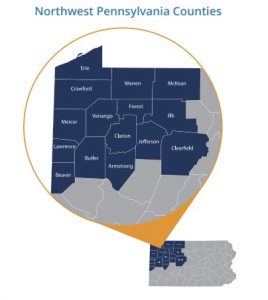 The Northwest Pennsylvania (NW PA) Veteran Suicide Prevention Program operates on a three-pronged approach involving healthcare providers, community organizations, and Veterans and their families. In this article, which summarizes a recent presentation by stakeholder partner Stacey Buettner, LCSW of UPMC Western Behavioral Health at Safe Harbor, the following topics are explored:
The Northwest Pennsylvania (NW PA) Veteran Suicide Prevention Program operates on a three-pronged approach involving healthcare providers, community organizations, and Veterans and their families. In this article, which summarizes a recent presentation by stakeholder partner Stacey Buettner, LCSW of UPMC Western Behavioral Health at Safe Harbor, the following topics are explored:
- The different types of gatekeeper training available
- Potential limitations of gatekeeper trainings according to literature
- Solutions to improve long term effectiveness of gatekeeper trainings
Read time: 5 minutes
A pdf of the presentation including sources, is available for download.
What are gatekeepers?
 In 2004, the Garrett Lee Smith Memorial Act prioritized the training of suicide prevention gatekeepers. These training programs are designed to improve knowledge, skills, and motivation to prevent suicide. A gatekeeper is an individual who can recognize a crisis and the warning signs of someone possibly contemplating suicide. Anyone can become a gatekeeper: parents. friends, neighbors, teachers, athletic coaches, ministers, doctors, nurses, office supervisors, squad leaders, foremen, police officers, advisors, caseworkers, firefighters, etc. Gatekeepers come from all walks of life and do not require any prior training or education.
In 2004, the Garrett Lee Smith Memorial Act prioritized the training of suicide prevention gatekeepers. These training programs are designed to improve knowledge, skills, and motivation to prevent suicide. A gatekeeper is an individual who can recognize a crisis and the warning signs of someone possibly contemplating suicide. Anyone can become a gatekeeper: parents. friends, neighbors, teachers, athletic coaches, ministers, doctors, nurses, office supervisors, squad leaders, foremen, police officers, advisors, caseworkers, firefighters, etc. Gatekeepers come from all walks of life and do not require any prior training or education.
What are some of the gatekeeper training options?
This presentation describes three gatekeeper training options:
- QPR
QPR stands for Question, Persuade, and Refer. Created in 1995, over one million Americans have been trained in QPR. General and specialized training sessions are available. - ASIST
ASIST stands for Applied Suicide Intervention Skills Training. Developed in 1993, over one million Americans have participated in ASIST’s 15-hour training program. - S.A.V.E.
Established by the Education Corps of the VA Center for Excellence for Suicide Prevention, S.A.V.E. emphasizes the following components:
Signs of suicidal thinking should be recognized
Ask the most important question, “Are you thinking of killing yourself?”
Validate the Veteran’s experience
Encourage and Expedite treatment and getting help.
Effectiveness of gatekeeper training
- Research suggests initial effectiveness as trainees report higher levels of suicide knowledge, skills, self-efficacy and intent to intervene.
- Pre- and post-tests are often used to determine initial effectiveness.
- Studies identified significant deterioration in initial effectiveness after 3 and 6 months.
- Limited research exists on the influence of gatekeeper training beyond one year.
Suggestions to improve interest in training and on-going participation
 Two areas of gatekeeper training need to be improved: promoting initial training and encouraging on-going interest and participation to reduce deterioration of initial effectiveness. Suggested strategies include:
Two areas of gatekeeper training need to be improved: promoting initial training and encouraging on-going interest and participation to reduce deterioration of initial effectiveness. Suggested strategies include:
- Connecting to participants’ social networks
- Emphasizing continued learning and professional development
- Enhancing community outreach opportunities
- Ensuring accessibility of training
- Offering training reminders
- Improving program implementation
- Creating professional certifications
- Offering refresher training sessions following initial gatekeeper trainings
Interested in gatekeeper training?
 Providing gatekeeper training is a cornerstone intervention included in the NW PA Veteran Suicide Prevention Program. In this five-year CDC-funded program, the Program Evaluation and Research Unit (PERU) and our stakeholders are partnering with the 15 counties of NW PA to reduce Veteran suicide deaths. Healthcare and community organizations throughout the 15-county region will be trained and offered technical assistance in using QPR, ASIST, and S.A.V.E. to develop greater awareness of suicide risks and take initial actions for encouraging treatment. If you are a healthcare provider or community organization residing or working in NW PA and would like to participate please contact us.
Providing gatekeeper training is a cornerstone intervention included in the NW PA Veteran Suicide Prevention Program. In this five-year CDC-funded program, the Program Evaluation and Research Unit (PERU) and our stakeholders are partnering with the 15 counties of NW PA to reduce Veteran suicide deaths. Healthcare and community organizations throughout the 15-county region will be trained and offered technical assistance in using QPR, ASIST, and S.A.V.E. to develop greater awareness of suicide risks and take initial actions for encouraging treatment. If you are a healthcare provider or community organization residing or working in NW PA and would like to participate please contact us.
To learn more, visit the program website at theresilientveteran.org.
Need Help? Know Someone Who Does? Contact the National Suicide Prevention Lifeline at 1-800-273-TALK (1-800-273-8255) or use the online Lifeline Crisis Chat. Both are free and confidential. You’ll be connected to a skilled, trained counselor in your area.

